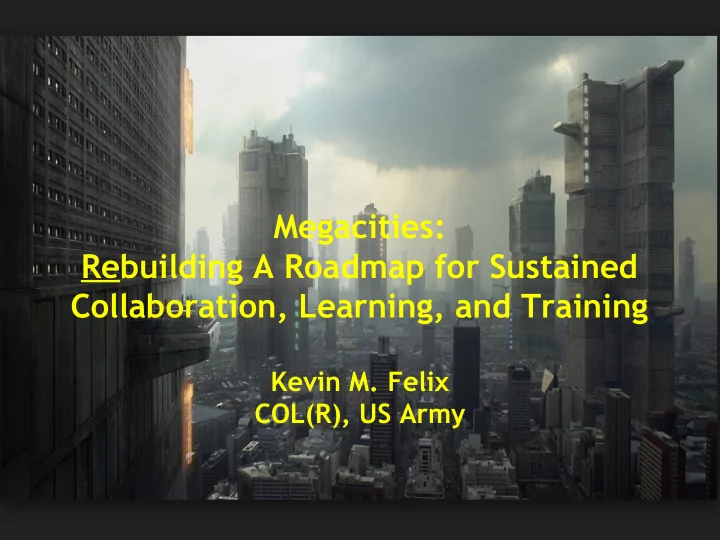

Megacities: Rebuilding A Roadmap for Sustained Collaboration, Learning, and Training Kevin M. Felix COL(R), US Army
Roadmap Lines of Effort: Reflect and Assess Learn and Test Build Collaborate Establish Sustain
Reflect and Assess • The study of urban terrain is clearly not a new endeavor, nor is the idea of megacities. • The Army has the responsibility to reflect on work of the past (JFCOM, and others partners), assess lessons learned, and carry that understanding forward through the development of running estimates of past learning. • Unified Quest assessed its own internal work in 2004 before reinvigorating its efforts addressing megacities in 2014. This approach ensures the Army does not relearn in areas where there are volumes of data, and use resources wisely to focus learning into the future.
Learn and Test • Wargaming and experimentation remain critical virtual components in the Army’s modernization strategy • Wargaming efforts of the past (Unified Quest 2004, 2014) have addressed megacities from a strategic and operational context, supporting concept development. It is the beginning, not the end. • The next step is to drive experimentation which, at the operational, down to tactical and entity-based level, can further expand capabilities development in the critical areas necessary to win in this multi-domain environment (surface, sub-surface, maritime, air, cyber, and space).
Build • Advanced Virtual, Constructive, and Gaming capabilities • Focused training opportunities at the operational and strategic level. Partnerships for Realistic Urban Training and investment • Ø P4: Public –Public, Public-Private partnerships with industry and academia provide funding through other means that can create value not only for the military, but for the public and private sector as well. • Partnerships for Realistic Urban Training and investment Ø Active, Guard, Reserve, HLS, and First Responders Ø National Guard is the linchpin for the Total Force in its relationships with First Responders
Collaborate • This is a team sport - the Army should improve connections with many academic institutions and government organizations thinking hard about the challenges of dense urban spaces. • The Army Capabilities Integration Center (ARCIC), Chief of Staff of the Army (CSA) Strategic Studies Group (SSG), Research, Development and Engineering Command (RDECOM), MCOE, the Office of the Assistant Secretary of the Army for Acquisition, Logistics and Technology (ASAALT), and others are all working to link concept and capability development. • Greater collaboration is possible through other networks to increase overall urban research capacity, especially through deliberate research efforts with our Allies and partners.
Establish Establish a Megacities Center for Advanced Research and Collaboration, • composed of strategists, concept and capability developers, academics, scientists, and international partners, as part of either the core component of this center, or as part of an advisory panel focused on this challenge. This center would help develop operational theories and approaches, test them, • and track academic progress at all institutions within the Army’s collaborative network. The center would also work closely with operational commanders to educate • them on the possibilities for satisfying their unique, geographically specific urban challenges through the integration of learning across the Army’s functional Centers of Excellence (Maneuvers, Fires, etc.). Center could establish professor and student exchanges with other partners and • interorganizational labs and centers to create more engagement, thinking and solution development for the unique, challenging operational environment of the megacity.
Sustain • Sustaining collaboration, learning, testing and training is important to ensure the Army is constantly assessing current assumptions and identifying new challenges within the operational environment, and new opportunities from the science and technology community. • Army Warfighting Challenges (AWFCs) are useful tools to sustain collaboration and integrate ideas across warfighting functions. AWFCs are enduring first order problems, the solutions to which improve the combat capability of the current and future force. • AWFCs create unity of effort around solution strategies in support of concept and capability development for dealing with the challenges of the megacity.
Recommend
More recommend